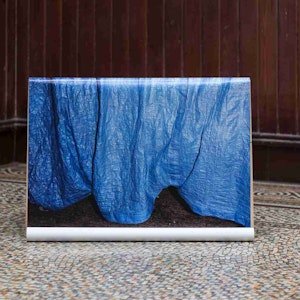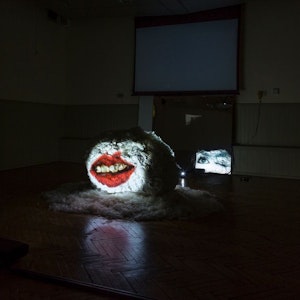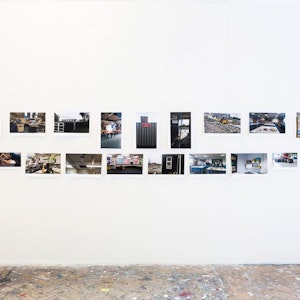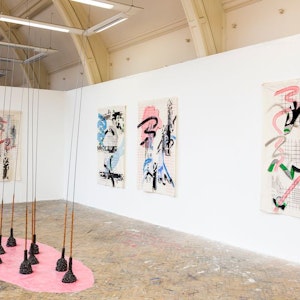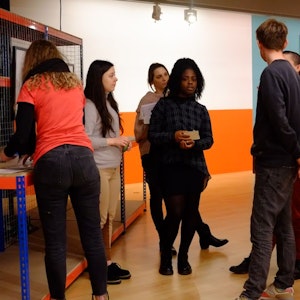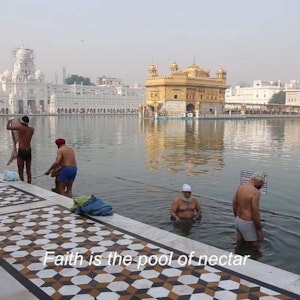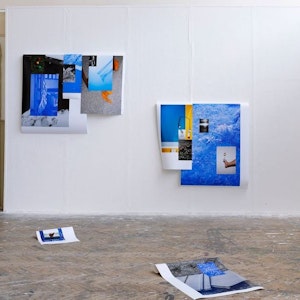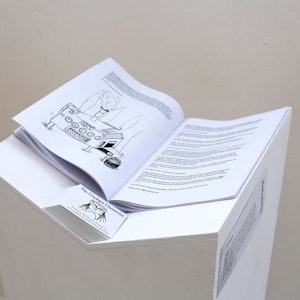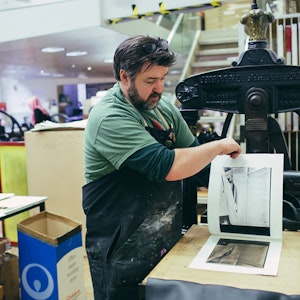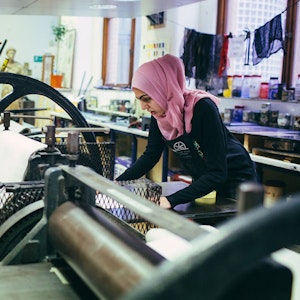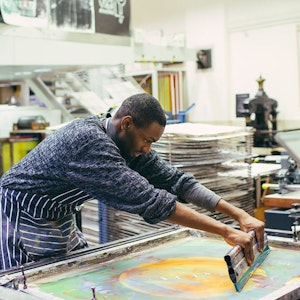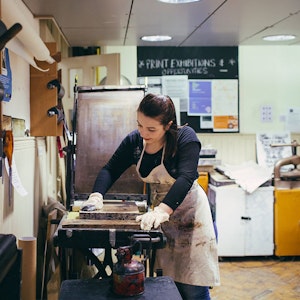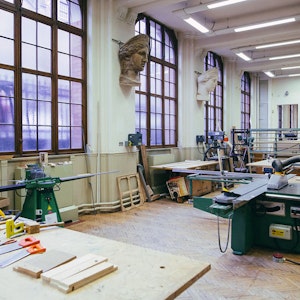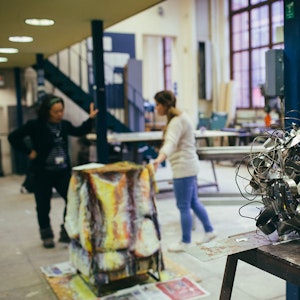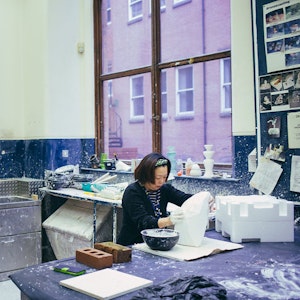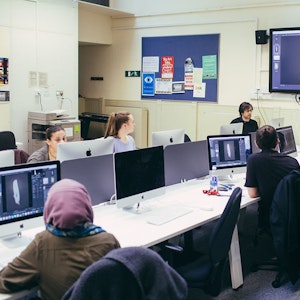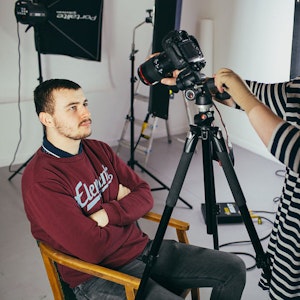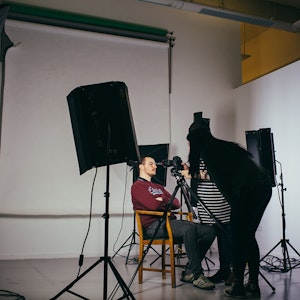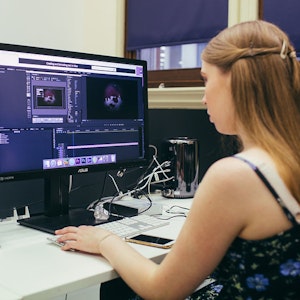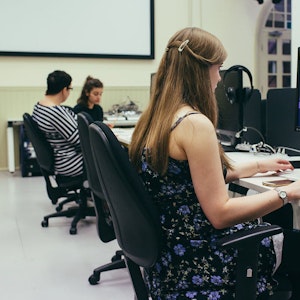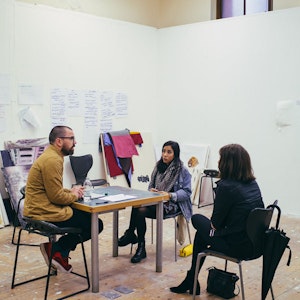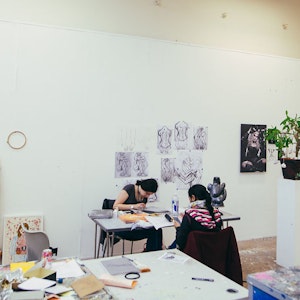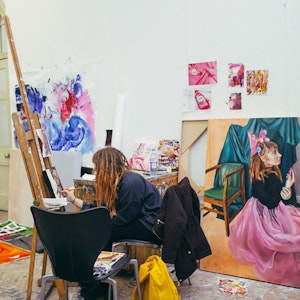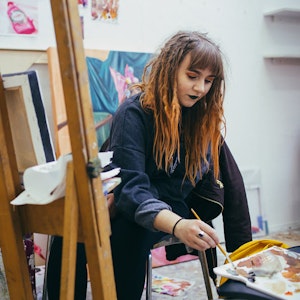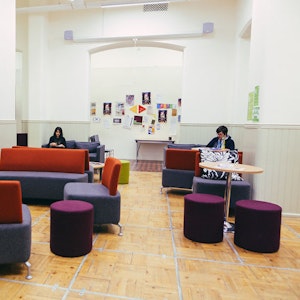
Arts and Education Practices - MA
Currently viewing course to start in 2024/25 Entry.
Our pioneering MA Arts and Education Practices course focuses on the exploration of educational models at the intersection of practice, teaching and pedagogic theory. The only Arts Education MA in the UK based in a School of Art, we provide a unique platform for the art educator....
- Level Postgraduate Taught
- Study mode Full Time/Part Time
- Location Margaret Street
- Award MA
- Start date September 2024
- Fees View course fees
- School Birmingham School of Art
- Faculty Faculty of Arts, Design and Media
This course is:
Open to International Students
Overview
Our pioneering MA Arts and Education Practices course focuses on the exploration of educational models at the intersection of practice, teaching and pedagogic theory.
The only Arts Education MA in the UK based in a School of Art, we provide a unique platform for the art educator. This setting helps to facilitate an innovative community of experienced and aspiring art educators, welcoming those willing to critique current practices to ask not only how we should teach art, but also how art can teach us.
What's covered in this course?
Our students come from diverse phases and sectors in the field of art and design education and the expanded fields of gallery, community and self organised educational practices. Through the course individual perspectives and experiences meet with those of your peers providing you with the stimulation and challenges that different perceptions can bring. We seek to evolve a dialogue through direct experience and engagement with the arts and their value as taught subjects, both within the institution and outside of it.
Our taught modules strengthen your subject knowledge and connect you with contemporary creative and educational practice. Taught sessions and tutorial contact are balanced with online content and assessment is spread throughout the year to ease workload. MA Arts and Education students follow a core modular structure that explores the past, current and future practice of arts education. You can personalise your learning through your choice of an optional module and pursue your interests within the expanded field of arts education through research and practice.
The structure of the course enables you to focus your research within the context of your own creative field and workplace. Through this study you build independent research leading to your major project that can be focused through educational models, workshops, creative practice and encounters that inform and are responsive to art educational contexts.
The course offers opportunities to connect with and expand your knowledge of your creative field through collaboration, live projects and visits that explore educational situations and projects.
Studying on MA Arts and Education Practices was a great privilege as the course allowed me time and space to reflect upon and revisit my art practice, as well as research my developing interest in faith schools and alternative arts education. Over the course of the year, I experimented with various materials and processes and felt the independence of the course was integral to achieving success.
Navi Kaur
Why Choose Us?
- This is a unique professional development opportunity at the intersection between art practice and educational theory.
- The MA Arts and Education Practices has a significant international reputation with alumni in over 20 countries worldwide, with strong educational profiles and working in a range of institutions and organisations.
- We work with each individual student to develop a route through the course to match their aspirations.
- Our students practice as artists, gain promotion within the field of education, pursue research or take a sideways step into another arts education related context.
- You will be supported by a highly professional staff team, doctoral researchers, technical demonstrators and artists in residence in a innovative, creative and supportive environment.
- Birmingham School of Art is an internationally recognised centre of excellence for art-based learning and research. We have a unique art education archive relating to the Arts and Crafts Movement, and Marion Richardson, amongst others.
- The course is based at Birmingham School of Art (Margaret Street), a fine example of Venetian Gothic architecture and an impressive purpose built Grade I listed art school.
OPEN DAY
Join us on campus where you'll be able to find out more about your course, learn about postgraduate finance and get an insight into studying at BCU. Booking for the next event isn’t open yet. Register your interest below and we’ll email you as soon as booking goes live.
Next Event: 29 June 2024
Entry Requirements
Essential requirements
Essential Requirements
|
Normally a first degree or its equivalent in an appropriate subject, and/or previous or concurrent experience in the arts and/or education. |
||
|
We also welcome applications from those mature applicants who may not satisfy the normal entry requirements. |
||
|
Applicants will also need a good portfolio. |
||
|
IELTS 6.0 overall with 5.5 minimum in all bands or its equivalent. |
||
If you have a qualification that is not listed, please contact us.
Fees & How to Apply
UK students
Annual and modular tuition fees shown are applicable to the first year of study. The University reserves the right to increase fees for subsequent years of study in line with increases in inflation (capped at 5%) or to reflect changes in Government funding policies or changes agreed by Parliament. View fees for continuing students.
Award: MA
Starting: Sep 2024
- Mode
- Duration
- Fees
- Full Time
- 1 year
- £8,925 in 2024/25
- Full Time
- 18 months (including Professional Placement - see below*)
- £9,820 in 2024/25
- Part Time
- 2 years
- Show fees
- £992 per 20 credits
- Year 1 - 100 credits
- Year 2 - 80 credits
Fees for Part-time students
This course can be studied on a Part-time study basis. The cost per year of study is based on credit requirements for that year.
International students
Annual and modular tuition fees shown are applicable to the first year of study. The University reserves the right to increase fees for subsequent years of study in line with increases in inflation (capped at 5%) or to reflect changes in Government funding policies or changes agreed by Parliament. View fees for continuing students.
Award: MA
Starting: Sep 2024
- Mode
- Duration
- Fees
- Full Time
- 1 year
- £17,710 in 2024/25
- Full Time
- 18 months (including Professional Placement - see below*)
- £19,485 in 2024/25
*Professional Placement option
The Professional Placement version of the course is optional and is offered as an alternative to the standard version of the course.
This will allow you to complete a credit bearing, 20 week Professional Placement as an integral part of your Master’s Degree. The purpose of the Professional Placement is to improve your employability skills which will, through the placement experience, allow you to evidence your professional skills, attitudes and behaviours at the point of entry to the postgraduate job market. Furthermore, by completing the Professional Placement, you will be able to develop and enhance your understanding of the professional work environment, relevant to your chosen field of study, and reflect critically on your own professional skills development within the workplace.
You will be responsible for finding and securing your own placement. The University, however, will draw on its extensive network of local, regional and national employers to support you in finding a suitable placement to complement your chosen area of study. You will also benefit from support sessions delivered by Careers+ as well as advice and guidance from your School.
Placements will only be confirmed following a competitive, employer-led selection process, therefore the University will not be able to guarantee placements for students who have registered for the ‘with Professional Placement’ course. All students who do not find a suitable placement or do not pass the competitive selection process will be automatically transferred back to the standard, non-placement version of the course.
Portfolio guidance
If you receive an offer to study this course, you will be required to submit a portfolio. We ask that this is submitted within four weeks of receiving your offer.
Please see our portfolio guidance page for tips on putting your portfolio together.
Portfolio guidance
If you receive an offer to study this course, you will be required to submit a portfolio. We ask that this is submitted within four weeks of receiving your offer.
Please see our portfolio guidance page for tips on putting your portfolio together.
Personal statement
You’ll need to submit a personal statement as part of your application for this course. This will need to highlight your passion for postgraduate study – and your chosen course – as well as your personal skills and experience, academic success, and any other factors that will support your application for further study.
Not sure what to include? We’re here to help – take a look at our top tips for writing personal statements and download our free postgraduate personal statement guide for further advice and examples from real students.
Course in Depth
Modules
In order to complete this course you must successfully complete all the following CORE modules (totalling 160 credits):
The purpose of the module is to enable you to undertake a sustained, in-depth and theoretically informed research project exploring an area that is of personal interest to you. It is important that we can support you appropriately, so you will be guided towards choosing a research topic which is relevant to your discipline and in which your lecturers have expertise. The outcome may take the form of a written dissertation or a practical outcome with accompanying reflective, critical and contextual material. The main consideration when choosing your topic is that it must be relevant to your programme and you should consider the relevance of this topic to your future academic or professional development.
This module enables you to articulate in verbal and written (or negotiated equivalent) forms the breadth and depth of your knowledge and understanding of relevant theories and contexts in relationship to your arts based practice, placement, internship or other negotiated professional engagement.
This module aims to convey the alternative histories of art and design education from the fifteenth century to the present day. In the context of the relationship between arts practice, art educational practices and the influence of broad educational beliefs upon the nature of art education a number of narrative themes are introduced.
This module will examine the diverse roles and practices of the arts in educational settings since 2000. It maps contemporary practices through educational and artistic trends and the political and cultural contexts within which art education is located globally. Art education in the present will be explored through a series of workshops, readings and group discussions that respond to specific texts, governmental initiatives, policies, new technologies, globalization, intercultural considerations and changing approaches to research in the field. The application of these contexts is considered within formal school-based art education, museum and gallery education, dialogical art practices and participatory community arts.
In order to complete this course you must successfully complete at least 20 credits from the following indicative list of OPTIONAL modules.
This module, Contemporary Philosophy & Aesthetics explores how Fine Art is made and understood conceptually. How thinking in Fine Art works. This may inform research into practice via the meeting of philosophy, visual culture and social contexts within Fine Art practices. We may look at exhibitions artists and cultural discourses. For example: texts, films, music, fashion and events. It sets the stage for developing your own critical knowledge of the complexities underlying modern and contemporary life and in so doing, building your concepts and language, in your own practices.
The purpose of this module is to introduce you to contemporary curatorial thinking. Throughout the module, you will encounter a range of concepts, themes, approaches and methodologies relevant to your discipline including the role of the curator and exhibition making; the museum and gallery as context and framework; the role of the artist-curator-artist, curating for new media and technologies and curating global exhibitions. You will be supported to develop skills in confidently articulating your knowledge in verbal and written forms.
This module attends to both historical and contemporary models of practice in relationship to the emergence of queer theory. We will explore a range of art practices and queer methods that critique or subvert dominant modes of representation and operation. Focus is given to the following areas: Introduction to queer theory, Art beyond representation, Queer Speech, Queer horror, Education and transgression, Queering the Archive; Care; Queer reading.
This module provides you with an insight into entrepreneurship and small business start-up within the arts and related sectors. Its focus is an exploration of the practicalities of starting-up a creative business. It also covers the nature of the creative industries as a whole as well as the significance of entrepreneurship within the arts and society as a whole.
The acts of photographing and researching are intrinsically linked. They are both activities concerned with expansion and contraction. If we imagine a photograph as a means to isolate a sphere of reality (with all of the caveats this statement demands) that are rendered, most often, in fractions of seconds. Then we could think in a similar way about research. An effort to know more and more about less and less.
This module will explore publishing as a dynamic contemporary art form, a vehicle for the dissemination of ideas and an exploration of radical formats for bringing your art to a wider public. You will be introduced to artist-made books, self-publishing, digital publishing and other non-gallery modes of sharing and communicating art.
The module will be based on a specific workshop process (e.g. for example in the print room this might be etching, screen-print or lithography etc.), technical method (e.g. for example this might be around casting techniques, film and video making, 3D modelling etc.) or material (e.g. for example this might be an investigation into the material properties of clay, stone, a textiles material, etc.). You will independently identify and investigate your chosen line of enquiry to enable you to engage in practical hands on experience of a fabrication/production process.
The module examines art as a social practice, its relationship with our present time and links to historical works and contexts. You will be introduced to key examples and debates within Social Practice with focus given to the following areas: Activism, Antagonism, Participation, Collaboration, Community, Environmentalism, Relational Aesthetics, Socially Engaged Practice, Dialogical Art & Institutional Critique.
This module provides a grounding in arts and transcultural communication, using artistic practices and discursive frameworks to highlight and examine issues related to communication. Communication, but also translation and interpretation intended from a linguistic, visual, cultural, artistic and curatorial perspective, are crucial when working internationally (and locally) with different communities. This module is for those students who aim at working and researching in a transcultural global environment more critically and effectively.
This module creates a trans-disciplinary space in order to explore art’s capacity to change the way we perceive our relationship to ecologies, whether they are environmental, social or psychological. Situated in the emerging field of the environmental humanities, the module will consider the history and theory of artworks associated with earth art, environmental art, and eco art from the 1960s to the present day. You will be introduced to a range of case studies and encouraged to unearth different strategies and methodologies in the environmental arts, from projects that pursue concrete political objectives to artworks that adopt eco-poetic approaches.
The module is an opportunity to learn and critically reflect on the skills of collaboration by enabling you to create a research-informed interdisciplinary project with students from complementary disciplines, or with academic staff.
Core modules are guaranteed to run. Optional modules will vary from year to year and the published list is indicative only.
Professional Placement Year
In order to qualify for the award of MA Arts and Education Practices with Professional Placement, a student must successfully complete all of the Level 7 modules listed above as well as the following Level 6 module:
This module is designed to provide you with the opportunity to undertake a credit bearing, 20-week Professional Placement as an integral part of your Master’s Degree.
The purpose of the Professional Placement is to improve your employability skills which will, through the placement experience, allow you to evidence your professional skills, attitudes and behaviours at the point of entry to the postgraduate job market. Furthermore, by completing the Professional Placement, you will be able to develop and enhance your understanding of the professional work environment, relevant to your chosen field of study, and reflect critically on your own professional skills development within the workplace.
Download course specification
Download nowCourse structure
For both the experienced or aspiring artists an/or educators the course ethos is one of facilitation, mentoring and collaboration. We seek to model a critical pedagogy where dialogue and mutual enquiry are emphasised.
The Arts and Education Practices course consists of two core modules (specialist and discipline specific); two common core modules and an option module which you chose to undertake one in Stage One. The first core modules- Narratives of Art & Design Education encourage students to develop related research ideas relevant to their particular interests and aspirations. The study on this course is interdisciplinary in nature and encompasses both theory-led and practice-led study.
The second stage of the course is framed through the second core module- Global Innovations in Art and Design Education and this stage of the course sees a shift to more independent inquiry through the common core module Research in Practice. This is supported through briefing sessions, group seminars and tutorials. Our seminar series complements Research in Practice providing a balance of topics dealing with contemporary art practice and theory. Where possible they are conducted by both School of Art staff and visiting lecturers: artists, critics, curators, writers and other related professionals.
In the final stage of the course, for the Faculty wide Major Project, you will write either a dissertation of 10,000-12,000 words or you will develop work for exhibition at the end of year MA show supported by a smaller amount of text.
Employability
Enhancing your employability skills
Studying an MA will help you to pursue or develop your career in a range of related professions across the educational sector and creative industries. This course will help to enhance your skillset and employability and either progress in your existing role or achieve your career ambitions in a new direction.
Many of our graduates have achieved regional, national and international recognition as professional artist educators and professionals in the creative industries sector.
Several modules on this course have been specifically designed to equip you with valuable transferable skills, for example Contemporary Curatorial Practice; Small Arts Business Set Up and Creative Publishing and Public Dissemination. These transferable skills include:
- Thinking in a creative, imaginative and speculative manner
- Demonstrating communication and presentation skills in practical, written and verbal forms
- Demonstrating adaptability and flexibility in a range of contexts
- Reflecting and communicating in an articulate, informed, confident and effective manner
- Working independently while demonstrating initiative and self-reliance
- Demonstrating motivation, organisation, planning and effective strategising skills
- Showing a capacity for good time management
- Actively linked with up-to-date local and regional opportunities.
We maintain excellent connections with major city centre institutions such as Birmingham Museums and Art Gallery (BMAG), Selfridges, Birmingham City Council, New Art West Midlands and Digbeth First Friday to name but a few.
Placements
Placements are one of the possible ways of fulfilling your modules and many of our students have chosen this route. There is scope for placements with a number of organisations in the city and beyond, however it is your responsibility to plan and organise your placement with the organisation you wish to work with.
Placements are a great opportunity to gain insight into how an organisation works and your reflection on their activities can be useful to them as you develop your research. Placements also give you the chance to meet and network with people in the education sector and creative industries. Our tutors are available to guide you through this process.
Navi Kaur
Artist and Teacher of Art at Nishkam High School
"Studying on the MA Arts and Education Practices programme was a great privilege as the course allowed me time and space to reflect upon and revisit my art practice, as well as research my developing interest in faith schools and alternative arts education, particularly within gallery settings and Punjabi schools situated in Gurdwaras (Sikh temples). Over the course of the year, I experimented with various materials and processes and felt the independence of the programme was integral to achieving success, as this encouraged me to approach galleries and organisations in the local arts community to share and experiment new works. This led to my first solo show at The GAP Arts Project and a number of student-led collaborative shows both at Margaret Street and an interim show at the CET Building in Coventry. The malleability of the course meant that I was able to balance my practice alongside my writing and was supported by my tutors to take up a research trip to Punjab - this developed into a short documentary film (Finding Space in Faith, 2018,), in which I explored my developing relationship with faith and family. This work was presented as my final project and exhibited as part of the end of year Masters degree show, Turn Out.
"After completing the course, I was fortunate enough to be supported by various arts organisations including Grand Union Gallery and Studios, with whom I am now a studio holder as part of their year-long BCU Graduate Residency Programme.
"Finding Space in Faith was widely shared across various platforms including on The White Pube's website as their November web resident. This led onto a collaborative exhibition at Stryx Gallery with a small number of my fellow Masters graduates, my second solo show at Recent Activity and more recently, exhibiting work at the UK's first Asian Woman Festival and becoming a member of Black Hole Club's 2019 cohort.
"Also after completing the course, I began my Initial Teacher Training and am currently working towards QTS with Staffordshire University on their PGCE Art and Design programme and am very privileged to be the newly appointed Teacher of Art at Nishkam High School from September 2019. I endeavour to be a positive role model for young people of colour in the community and create opportunities for them that were not accessible for me."
Laura Onions
Artist, Lecturer in Fine Art and Gallery Assistant at Grand Union.
"Having the space and time to identify how I wanted to practice as an artist through the contexts of education was important to me in selecting this MA. The expanded nature of the course enabled me to play within a critical framework that supported and challenged my practice and thinking. The most powerful aspect of this course was developing an educational ethos that has affected the way in which I interact and make decisions in my work with communities, galleries and teaching in Higher Education."
Melanie Woodhead
Course Leader of the Foundation Degree Fine Art & Contemporary Craft at Malvern School of Art.
"The MA Arts and Education Practices course was my ideal programme of study because it gave me fresh perspective on my position as an experienced Fine Art lecturer in Further and Higher Education, and in my role as a freelance art educator. As an artist it also challenged and shifted my creative identity towards unfamiliar territory. Since completing the course, I have started a new job as Course Leader of the Foundation Degree Fine Art and Contemporary Craft at Malvern School of Art, a role in which I constantly draw and reflect upon my experiences at BCU."
We offer part-time temporary positions within the University. This allows you to work while you study with us, fitting the job around your course commitments.
International
Birmingham City University is a vibrant and multicultural university in the heart of a modern and diverse city. We welcome many international students every year – there are currently students from more than 80 countries among our student community.
The University is conveniently placed, with Birmingham International Airport nearby and first-rate transport connections to London and the rest of the UK.
Our international pages contain a wealth of information for international students who are considering applying to study here, including:
- Explore some of the good reasons why you should study here.
- Find out how to improve your language skills before starting your studies.
- Find all the information relevant to applicants from your country.
- Learn where to find financial support for your studies.
Our international students
The Art Based Master’s Programme is an international community of aspiring researchers and professionals and the programme attracts candidates from all over the world including: Africa, Brazil, Bulgaria, Canada, China, Cyprus, Finland, France, Germany, Greece, Holland, Italy, India, Iran, Israel, Japan, Lithuania, Kazakhstan, Malaysia, Nigeria, Norway, Poland, Romania, South Africa, Saudi Arabia, Thailand, Taiwan and the USA.
This diversity provides you with an opportunity to study with people from diverse social, cultural and ethnic backgrounds and who bring a wealth of experience to the programme. This gives the ABM programme a dynamic energy that enriches everyone’s educational experience.
Facilities & Staff
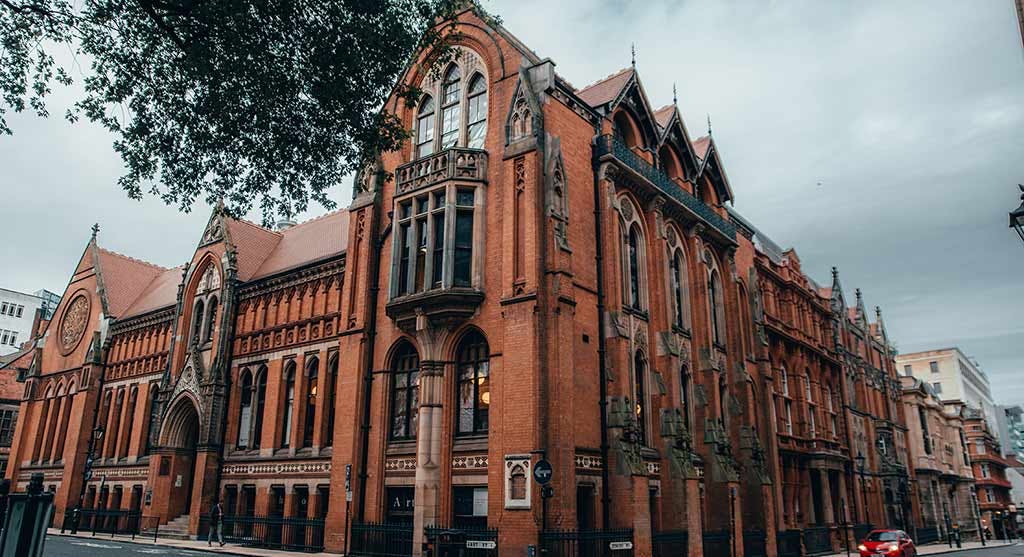
Our Facilities
We are constantly investing in our estate and are currently in the process of spending over £400 million on new learning facilities.
Birmingham School of Art (an impressive purpose built Grade 1 listed example of Venetian Gothic architecture) was the first major renovation project undertaken by the university (£5.5m refurbishment). The School provides an incredible resource for the production of art and its associated fields of study. The building has a range of facilities available including studios, workshops, specialist art and design library, bookable spaces and lecture/seminar rooms.
Our staff
Cathy Wade
Course Leader MA Arts and Education Practices
Cathy is an artist, writer and academic whose work is concerned with how art can be created and distributed in collaborative partnerships and through the creation of commons. Her work seeks to understand the experience of contemporary conditions through social practice and is realised as digital video, print, installation, public art, publication,...
More about Cathy